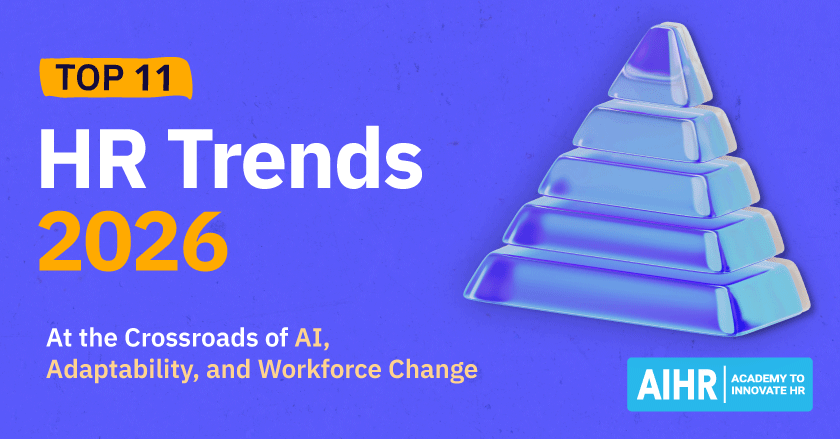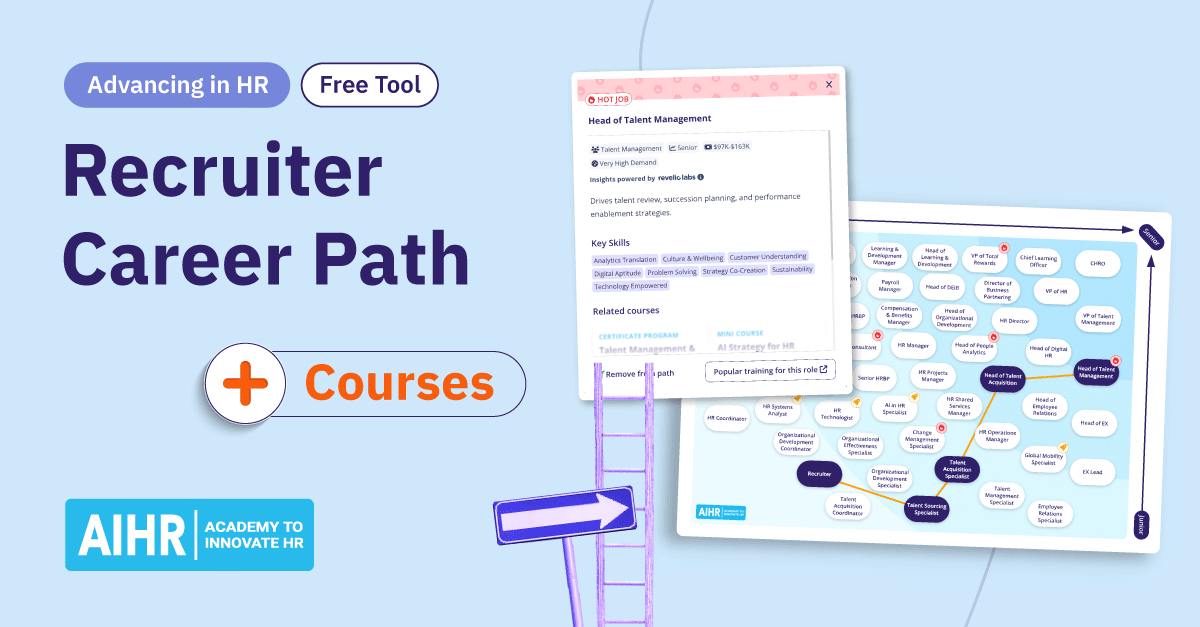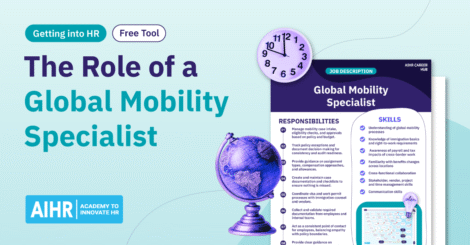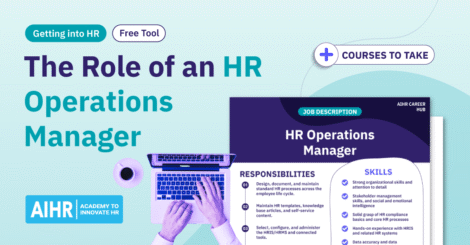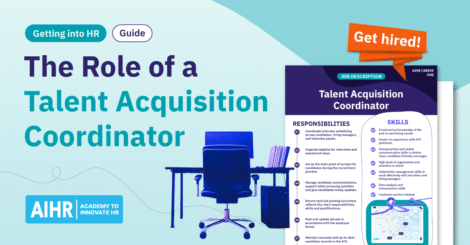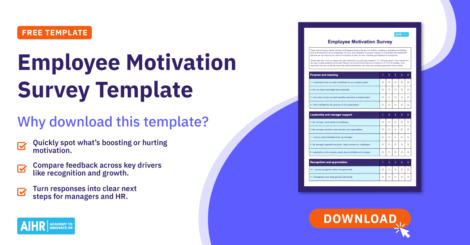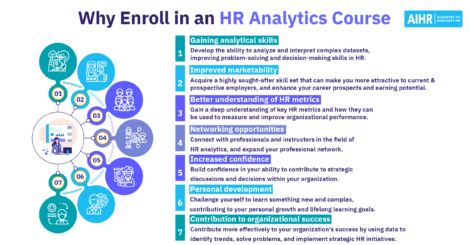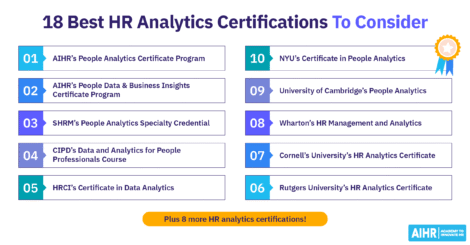Recruiters play a critical role in business success. The Recruiter career path is important to understand because when companies leave roles unfilled, they lose revenue, productivity drops, and teams burn out. A good recruiter can help prevent this.
If you’re thinking about a career in recruitment, you can expect to gain strategic insight and leadership skills as you grow in the role, which can lead to top jobs like Head of HR or even CHRO. This article discusses what the position entails, what to do to become a Recruiter, and the possible career paths you can take to progress to and from the role.
Contents
The role of a Recruiter, explained
A day in the life of a Recruiter
The Recruiter HR career path
Starting a career in recruitment
Progressing in a recruiting career
Recruiter career path specializations
AIHR Recruiter certificate programs to take
The role of a Recruiter, explained
A Recruiter connects a company with the right people for its open jobs. The scope varies — in some organizations, you’ll own the full hiring process, while in others, you’ll focus on specific areas such as sourcing or succession planning. You can work internally (as part of a company’s HR team), externally (for a staffing agency), or independently (as a consultant or freelancer).
Is there progression in recruitment?
The answer is “yes”. There’s plenty of room to grow. Recruiters can move up to senior roles like Head of Talent Acquisition or Head of HR. Others specialize in fields like tech or healthcare recruitment, often leading to higher pay.
Daily tasks of a Recruiter
Recruiters juggle many responsibilities. Common tasks include:
- Sourcing candidates: Searching job boards, LinkedIn, referrals, and networks.
- Screening and interviews: Reviewing resumes, holding screening calls, and managing assessments.
- Candidate communication: Keeping candidates informed, answering questions, and providing feedback.
- Interview management: Scheduling interviews, updating the ATS, and tracking candidates.
- Admin work: Posting jobs, running background checks, and handling paperwork.
- Employer branding and onboarding: Supporting early onboarding tasks and shaping company perception.
- Offer management: Negotiating salaries and benefits.
- Continuous improvement: Tracking metrics, finding bottlenecks, and improving processes.
A day in the life of a Recruiter
A Full-cycle Recruiter’s average day might look like this:
A Recruiter typically has a packed schedule, but may also enrich themselves professionally outside work. After hours (or during breaks on relatively lighter workdays), they may pursue HR certifications and continuing education or attend webinars, seminars, and HR conferences.
They may also read industry publications to stay updated on the latest recruitment trends and best practices, or engage in professional networking on LinkedIn and other platforms (e.g., industry forums and Slack channels).
The Recruiter HR career path
Here’s what you can expect from a Recruiter career path, from starting a career in recruitment to progressing to more advanced, senior positions.
Starting a career in recruitment
Whether you’re making a lateral transition from another HR role or starting an HR career as a fresh grad, following these steps will give you a solid foundation:
Learn the basics
- Understand the full recruitment lifecycle: Familiarize yourself with every hiring stage, from sourcing to employee onboarding. Map out the entire process in your organization from memory and spot gaps in your understanding. Then, fill these gaps with support from mentors.
- Master sourcing techniques: Familiarize yourself with using job boards and platforms like LinkedIn. Additionally, you can learn Boolean logic and study how the top sourcers on your team find great candidates. Ask them for tips and advice on how to improve your recruitment process.
- Develop your screening skills: Learn to scan and review résumés quickly. This lets you assess basic qualifications and core competencies. Pair with a senior Recruiter to review résumés together, listen to recorded screens (if allowed), and practice during mock calls.
- Improve your communication skills: Make active listening second nature. You can start by observing experienced Recruiters as they interact with candidates and hiring managers. At the same time, seek feedback on your communication style through emails or calls.
- Learn recruitment technologies: Become a power user of your company’s Applicant Tracking System (ATS); set aside 15 to 30 minutes every week to experiment with the tool. You can also use internal training resources, explore free ATS sandboxes, or follow tutorial series on YouTube or vendor blogs.
- Understand employment laws and regulations: Non-compliance risks serious legal and financial issues, and Recruiters may also be held responsible. Understand key legal principles in hiring. These include equal opportunity laws, data protection rules, and anti-discrimination policies.
- Understand recruitment KPIs: Companies often evaluate Recruiters using KPIs such as time to fill, cost per hire, and candidate experience scores. Understanding and optimizing recruiting metrics is critical to demonstrating your organizational impact as a Recruiter.
- Build a network: A good network helps you find top talent, keep abreast of industry developments, and be part of a community. Set up coffee chats with senior Recruiters to gain valuable insights into recruiting, and attend conferences to build your network.
Is recruitment a good career path?
As a Recruiter, you solve critical business problems and connect professionals to their dream roles. If you’re good at your job — especially if you work in an agency setting or a high-growth industry like tech — recruitment can be an exciting, meaningful, and lucrative career.
Audit your skill set
Employers look for college degrees and prior HR or business administration experience. Without these qualifications, it’s especially important to prove that you have the strengths, knowledge, and skills to be a successful recruiter.
Start by listing your qualities, skills, and experience. Then, map them to the competencies you’ll need. If you’ve worked in sales, you could mention skills like negotiation and people skills. As a Recruiter, you can use this experience to manage stakeholder relationships.
Similarly, administrative experience teaches you multitasking and attention to detail. If you have a customer service background, you’ll likely have empathy and communication skills. Audit your list for areas for improvement, and enroll in courses from reputable institutes like AIHR to bridge gaps in your knowledge.
Master recruiting to further your HR career
To propel your HR career forward as a Recruiter, you must build strong sourcing and communication skills, master recruitment tools, and keep learning to stay ahead of hiring trends.
✅ Build an effective end-to-end recruitment process
✅ Master sourcing to identify and engage best-fit candidates
✅ Increase candidate quality with effective screening
✅ Learn essential recruitment analytics skills
🎓 Future-proof your HR career with a flexible, online Sourcing & Recruitment Certificate Program.
Develop essential skills and competencies
- Strategic thinking: Strategic thinking allows Recruiters to align hiring with long-term business goals. It shifts you from reactive filling to proactive workforce planning. Study books like The McKinsey Way to understand strategic frameworks or enroll in AIHR’s Strategic Talent Acquisition Certificate Program to level up.
- Data analysis: Many talent acquisition functions rely on reams of data to inform strategies, measure ROI, and forecast trends. Learn how to interpret and analyse data by signing up for courses like AIHR’s HR Metrics and Dashboarding Certificate Program.
- Artificial intelligence (AI): Although AI is a powerful tool that can take time-consuming tasks off your plate, there are many drawbacks you must learn to handle: hallucinations, plagiarism, and errors. Go beyond dabbling with ChatGPT by taking a course like Bersin Academy’s Elevating Talent Acquisition with AI course.
- Interviewing: Interviewing is about reading between the lines to ascertain a candidate’s values, strengths, and potential fit. Poor judgment can lead to mis-hires. Sharpen your skills by learning how to read body language and observing other interviews.
- Negotiation: Negotiation helps Recruiters close offers while keeping relationships intact. Shadow an experienced Recruiter during offer calls, and keep a journal to document your observations. You can also ask a senior colleague to role-play a mock negotiation with you.
- Stakeholder management: As a Recruiter, you’ll rarely make hiring decisions alone. Learn how to align with hiring managers, candidates, and cross-functional partners, and drive timely decisions that ensure top talent fills open positions at your organization.
Look for entry-level positions
If you’re new to the profession, look for internships or entry-level roles like:
- Recruitment Assistant/Coordinator
- Junior Recruiter
- Talent Acquisition Assistant/Coordinator
- HR Assistant/Coordinator
These positions often involve supporting the recruitment and talent acquisition teams with administrative tasks like scheduling interviews and assisting with candidate sourcing. You can also read our in-depth guide on how to become a Recruiter for useful tips on getting started.
How much does a Recruiter make?
It depends on a few factors: are you an internal or external Recruiter? What is your compensation structure? Do you get commissions and bonuses? Generally speaking, salaries average between $51,374 and $79,730 annually. Learn more.
Progressing in a recruiting career
Once you’re in, recruitment and talent acquisition offer many chances to move up. Here, we’ve provided examples of different stages in the recruitment career progression. Recruitment and talent acquisition are often used interchangeably, but differ in focus. However, we’ve provided two different but relevant lists since the paths often intersect.
Career progression in recruiting
Recruiter: As a Recruiter or Recruitment Coordinator, you will be responsible for managing the full recruitment lifecycle for specific roles, typically under the guidance of a Senior Recruiter or manager. Your tasks will include:
- Finding, screening, and attracting qualified applicants
- Coordination and administrative tasks
- Interviewing and negotiations.
Possible career progression:
- Recruiter → Senior Recruiter → Headhunter
- Recruiter → Senior Recruiter → Talent Manager
- Recruiter → Recruitment Process Outsourcing (RPO) manager.
Senior Recruiter/Recruitment Manager: After two to three years of experience and a proven track record, you’ll handle more complex roles, mentor Junior Recruiters, and potentially lead important recruitment projects. Your tasks could include:
- Managing a team
- Optimizing the recruitment process
- Contributing to employer branding initiatives.
Possible career progression:
- Senior Recruiter → Headhunter
- Senior Recruiter → Talent Manager
- Senior Recruiter → RPO manager
Headhunter: A headhunter is usually an external consultant hired by companies to find candidates for specific positions, usually senior roles or the C-suite. Tasks could include:
- Developing and maintaining a strong network of industry professionals and candidates
- Using proactive sourcing techniques and market research to identify candidates
- Presenting suitable candidates to clients and coordinating interviews and feedback with candidates.
Possible career progression:
- Headhunter → Talent Manager → Head of Talent Acquisition
- Headhunter → Independent Recruitment Consultant
Career progression in talent acquisition
Talent Researcher: A Talent Researcher is responsible for identifying, sourcing, and building a pipeline of qualified candidates for open positions with targeted, data-backed sourcing strategies. Tasks include:
- Building and managing talent and candidate databases for future openings
- Using insights from candidate profiles to fine-tune processes
- Preparing candidate profiles for presentation to stakeholders.
Possible career progression:
- Talent Researcher → Recruiter → Headhunter
- Talent Researcher → Talent Acquisition Specialist → Talent Manager
Talent Acquisition Specialist: This role is a more strategic one involving a deep level of specialization. You may focus on specific industries, skill sets, or candidate pools (such as engineering professionals or C-suite executives). Tasks include:
- Strategic sourcing and building long-term talent pipelines
- Participation in succession planning
- Guiding and advising hiring managers with interviews and evaluations.
Possible career progression:
- Talent Acquisition Specialist → Talent Manager
- Talent Acquisition Specialist → Head of Talent Acquisition
- Talent Acquisition Specialist → Headhunter
Talent Manager: Talent management focuses on building and sustaining a high-performing workforce through ongoing development and strategic planning for the future. Here, your tasks could include:
- Oversee the development, implementation, and embedding of succession planning practices
- Contributing to the design and implementation of career development and retention strategies, tools, and resources
- Advise business teams on trends and opportunities in the internal talent pool.
Possible career progression:
- Talent Manager → Head of Talent Acquisition
Head of Talent Acquisition: This role involves the end-to-end management of talent supply and demand, not just ongoing hiring needs. Tasks would include:
- Overseeing talent acquisition, recruitment, employee development, and succession planning functions
- Building, maintaining, and handling high-level stakeholder relationships
- Monitoring and evaluating the effectiveness of talent management programs and initiatives.
Career progression:
- Head of Talent Acquisition → Divisional/ Regional HR Head → Head of HR → CHRO
If you’re keen on a career in talent acquisition, check out AIHR’s Talent Acquisition Certificate Program. You can also explore more paths with our Career Map Tool.
Recruiter career path specializations
This is the era of the T-shaped HR professional. You should have breadth and range in your competencies, as well as extensive expertise in at least one of them. Along with mastering recruitment and talent acquisition, building standout expertise in specialized areas (e.g., DEIB recruiting) can seriously boost your earning power.
Industry specialization
- Technology Recruiting (Engineering, Data Science)
- Healthcare Recruiting
- Pharmaceutical/Biotech recruiting
- Banking and Financial Services
- Campus Recruitment
Niche role specialization
- Executive recruiting (focus on the C-suite)
- Technical recruiting: (software engineers, data scientists, AI/ML engineers)
- Cybersecurity
- Robotics
Are you a T-shaped HR professional? Take this assessment to find out.
What other jobs can a Recruiter do?
A Recruiter’s strong interpersonal skills and ability to solve problems under pressure allow them to do well in careers like sales and marketing, or other HR functions like compliance and industrial relations.
AIHR Recruiter certificate programs to take
AIHR has several online and self-paced certificate programs to support those on a Recruiter career path, at different stages of their careers. Below are some ideal programs for beginners:
- Sourcing and Recruitment Certificate Program: The Sourcing and Recruitment Certificate Program lays the foundation for entry-level roles.
- Talent Acquisition Certificate Program: The Talent Acquisition Certificate Program helps those who wish to specialize build the competitive skill set needed to create and implement a talent acquisition strategy.
- HR Generalist Certificate Program: If you’re planning a lateral move into an HR Coordinator or HR Generalist role, consider the HR Generalist Certificate Program.
To sum up
Recruitment is more than filling open roles — it’s about solving one of the most expensive challenges businesses face: finding and keeping the right people. As a Recruiter, you’ll build skills that are valuable in every industry, from sourcing and negotiation to strategy and leadership. These skills can open doors to senior HR roles or specialized paths that keep your career future-proof.
If you’re curious, driven, and people-oriented, a Recruiter career path offers variety, growth, and impact. Whether you start in an entry-level role, move into talent acquisition, or specialize in executive search, there’s no shortage of growth opportunities. With the right training and mindset, a recruitment career can be resilient and rewarding, even in uncertain times.


